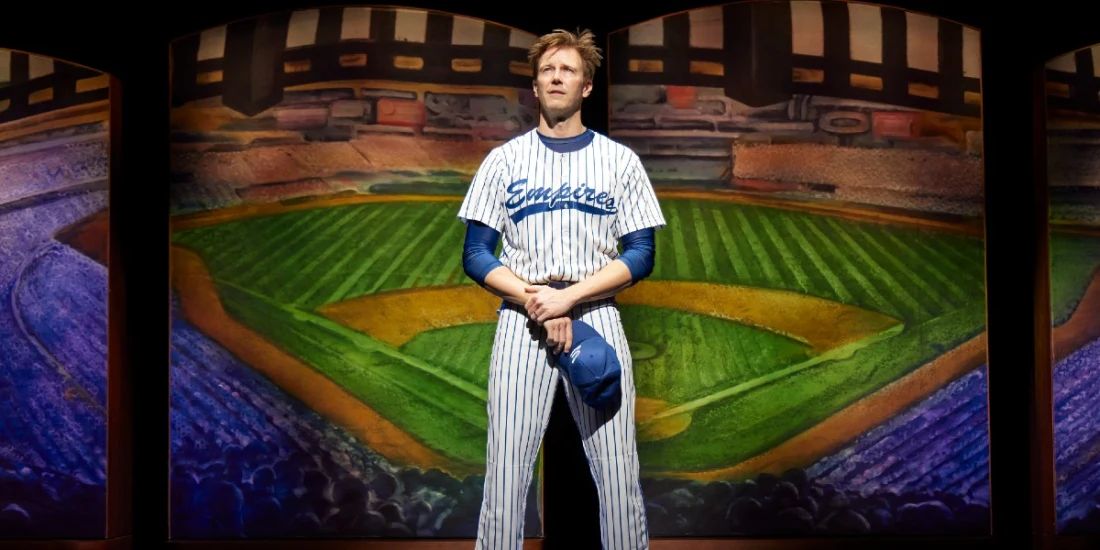'Take Me Out' rookie Bill Heck on joining the Broadway team of the hit revival
Batter up! The Tony Award-winning revival of Richard Greenberg’s thrilling baseball dramedy, Take Me Out, is back on Broadway for an encore run through February 5 with a key change in the lineup.
Cabaret alum Bill Heck deftly slides into the role of shortstop Kippy Sunderstrom, aka “the most intelligent man in major league baseball.” Kippy narrates the play and interacts with other teammates including Darren Lemming (Jesse Williams), who throws a game-changing curveball when he announces to the press that he’s gay.
“The original production of the play in 2003 was one of the first Broadway shows I ever saw. It’s always had a close place to my heart,” says Heck, who has a Master’s degree from New York University.
Between work and home demands, Heck didn’t see director Scott Ellis’s staging, which means he missed Patrick J. Adams (Suits) as Kippy and Jesse Tyler Ferguson’s Tony-winning performance as Mason, a financial guru who unexpectedly falls head over heels for baseball. Ferguson and Heck previously shared the stage in 2010 in a Shakespeare in the Park run of The Merchant of Venice.
That open-air production followed Heck’s Off-Broadway breakthrough in Horton Foote’s three-part, nine-hour drama, The Orphan Home Cycle. On screen, Heck appears in FX’s action thriller The Old Man, Amazon Prime’s I Know What You Did Last Summer, and in the upcoming movie Dust, starring Sarah Paulson.
Now, he's back on Broadway for the first time in nearly nine years. Heck talked with New York Theatre Guide about being the new kid on the bench in Take Me Out, why the play bats a home run, and acting in his birthday suit.
Get Take Me Out tickets now.
What’s it like being the new guy on a team that rode this revival all the way to a Tony win?
It’s been really challenging. It's obviously a pretty hefty role. I made sure I was off-book before I came in because it would have been disastrous otherwise. I had my own curiosities and ideas about the part and play, but my primary interest was preserving the integrity of the production and the company. Patrick was fantastic by all accounts, so I’m sort of glad I didn’t see it. I was able to come into things a little fresher and maybe a little more pure.
What struck you about the play when you saw the 2003 Broadway run?
It was, and it remains, extremely relevant with all the conversations about inclusivity and diversity. What landed for me initially was Mason’s famous “baseball is democracy” speech. It was filled with this unabashed joy of discovering something new and coming to a new understanding of himself in the world. It’s just beautiful.
That speech was very potent when I revisited the show on election night.
It was our quietest audience by far. I don't know if people were more thoughtful or more uneasy, or if it was the changing weather. Were they more nervous because our democracy might be on the verge? It’s hard to know, but it was definitely a unique performance in this run thus far.
You’ve said that appearing in the TV series The Closer relatively early on in your career in 2007 opened various acting doors. How did Take Me Out come your way?
The director who cast me in that two-episode arc of The Closer was Scott Ellis. He reached out through reps about my availability for the play. We didn’t talk directly until the deal was set.
Did you play baseball? You toss the ball during the play and show off a decent arm.
I was a soccer kid, but I’m a lifelong Chicago Cubs fan. I was born in Arizona, where their spring training is. Both my folks are from outside of Chicago. Some of my earliest, fondest memories are of being with my grandfather at Wrigley Field. Baseball is in me in a very integral, historic kind of way.
How does being naked in Take Me Out compare to being nude on stage as Joe Pitt in the 2010 Off-Broadway run of Angels in America?
I was actually telling somebody recently that the nudity in Angels in America is wildly different. Joe is Mormon, so for me, shedding his undergarments as a show of love and commitment for Louis was potentially very fraught. I was wrapped up in that specific experience.
When I saw Lee Pace play Joe on Broadway in Angels in America some years later, he did that scene with such freedom, as though he was really embracing himself for the first time. I thought, “Wow, that’s an amazing choice.” Seeing Lee do that years ago has helped make this easier for me now. That openness can apply to this situation.
@Takemeoutbway on Twitter noted that a publication called you “the hot new DILF” in the play. Your reaction?
I really don’t know what to do with that. If I’m being honest, I’m flattered.
Get Take Me Out tickets now.
Originally published on

